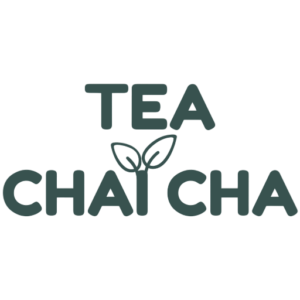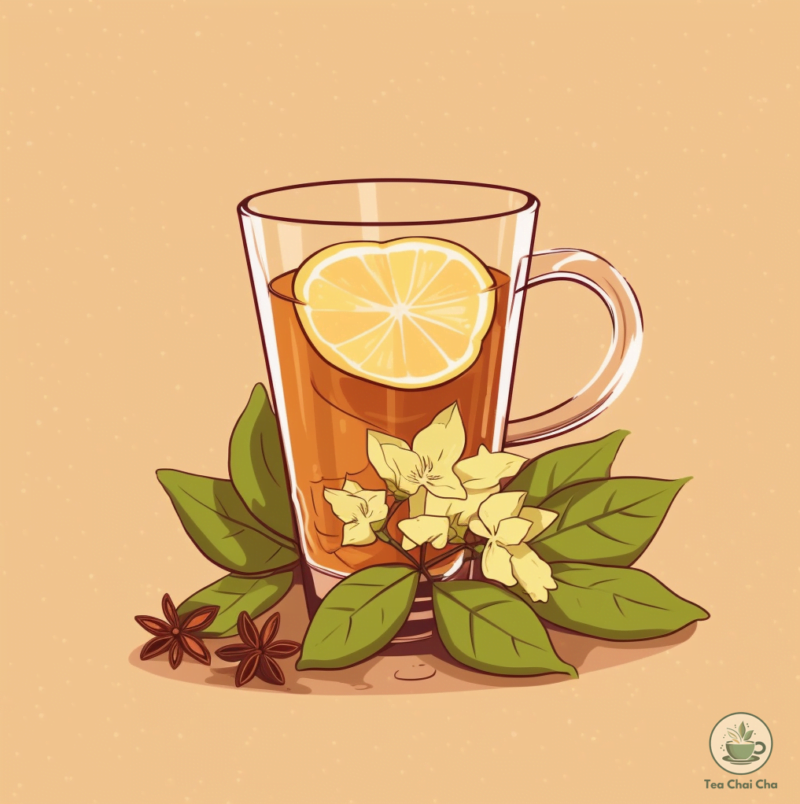Tea has been sipped and savored for centuries, but the caffeine factor can sometimes be a bit of a mystery.
You might think, “Is my cup of tea packing a punch of energy, or is it just a soothing sip?“
If you simply ask, “does tea have caffeine?“, then, here’s the answer:
Yes, tea does have caffeine ranging from 0 mg to 90 mg per 8 oz. cup, depending on the type of tea.
Not all teas are created equal in the caffeine department.
Some are bursting with the caffeine, while others are much more chill.
So, whether you’re team green, black, or herbal, there’s a lot to explore.
What Is Caffeine?
Well, think of caffeine as a little pick-me-up ninja found in some of your favorite drinks and snacks.
It’s a natural stimulant that can give you a jolt of energy when you need it most.
You know that feeling when you’ve had a cup of coffee, and suddenly you’re wide awake and ready to conquer the world?
Yep, that’s caffeine at work.
But it’s not just coffee that packs this punch – caffeine also hangs out in other ingredients.
It’s a versatile compound found in the seeds, nuts, and leaves of various plants.
Check out this caffeine treasure hunt among some of our favorite botanical sources:
1. Camellia Sinensis Plant
The go-to for tea lovers, this plant is the caffeine master behind your soothing cup of tea.
2. Coffea Arabica
Coffee enthusiasts, you’ll love this one!
Coffea arabica is where your morning pick-me-up gets its caffeine zing.
3. Cola Acuminate
This multitasker isn’t just for soft drinks.
It’s a nut, a tea ingredient, and a soft drink superstar, all thanks to its caffeine content.
4. Theobroma Cacao
Chocolate lovers, rejoice! Theobroma cacao, the source of that delectable chocolatey goodness, also houses caffeine within its sweet embrace.
5. Paulinia Cupana
Ever heard of guarana?
It’s not just for energy drinks and snack bars; it’s a caffeine powerhouse derived from the paulinia cupana plant.
So What Happens When You Consume Caffeine?
When you consume caffeine, it zips through your bloodstream and heads straight for your brain.
Once there, it tells your brain cells, “Hey, wake up and stay alert!“
That’s why you might feel more awake, focused, and ready to tackle that to-do list after a caffeine boost.
But be warned, caffeine is a bit of a double-edged sword.
While it can give you a fantastic energy kick, too much of it can leave you feeling jittery or give you trouble sleeping.
So, it’s all about finding that sweet spot between “I need a boost” and “I’ve had enough!“
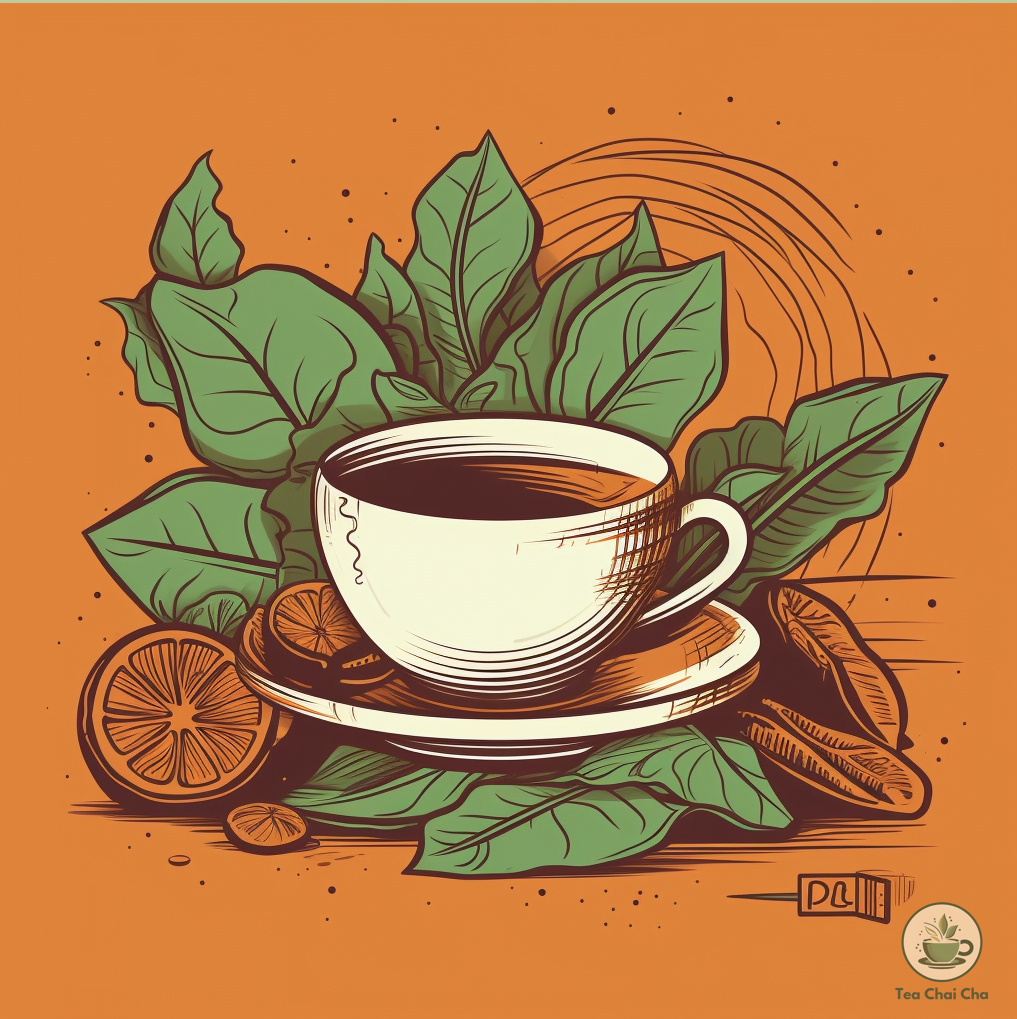
Why Does Tea Have Caffeine?
Well, it turns out that caffeine isn’t just there to perk us up in the morning.
Tea plants, like any other living beings, have their own survival strategies.
Caffeine, believe it or not, is one of them.
Caffeine acts as a natural pesticide for tea plants.
It deters insects and other creatures from munching on the leaves.
Imagine being a tea plant, and you’ve got these pesky bugs trying to feast on your precious leaves – what do you do?
You produce caffeine to say, “Hey, find your snack somewhere else!” Smart, right?
But Why Doesn’t Caffeine Affect Us?
Now, you might be wondering, “If caffeine is a pesticide, why doesn’t it harm us when we drink tea?”
That’s because humans have developed a bit of a caffeine tolerance over the years.
When we consume caffeine in moderate amounts, it gives us that alertness and energy boost without causing harm.
How Much Caffeine Is in Tea
So, how much caffeine is swimming around in your tea cup?
Well, the answer is: it varies.
Typically, tea leaves have 3% caffeine by weight but this can range from 1.4% to 4.5%.
Tea isn’t a one-size-fits-all caffeinated affair.
First off, tea comes in various flavors and types, right?
We’ve got black, green, white, oolong, and herbal teas, to name a few.
Each of these teas carries a different caffeine load.
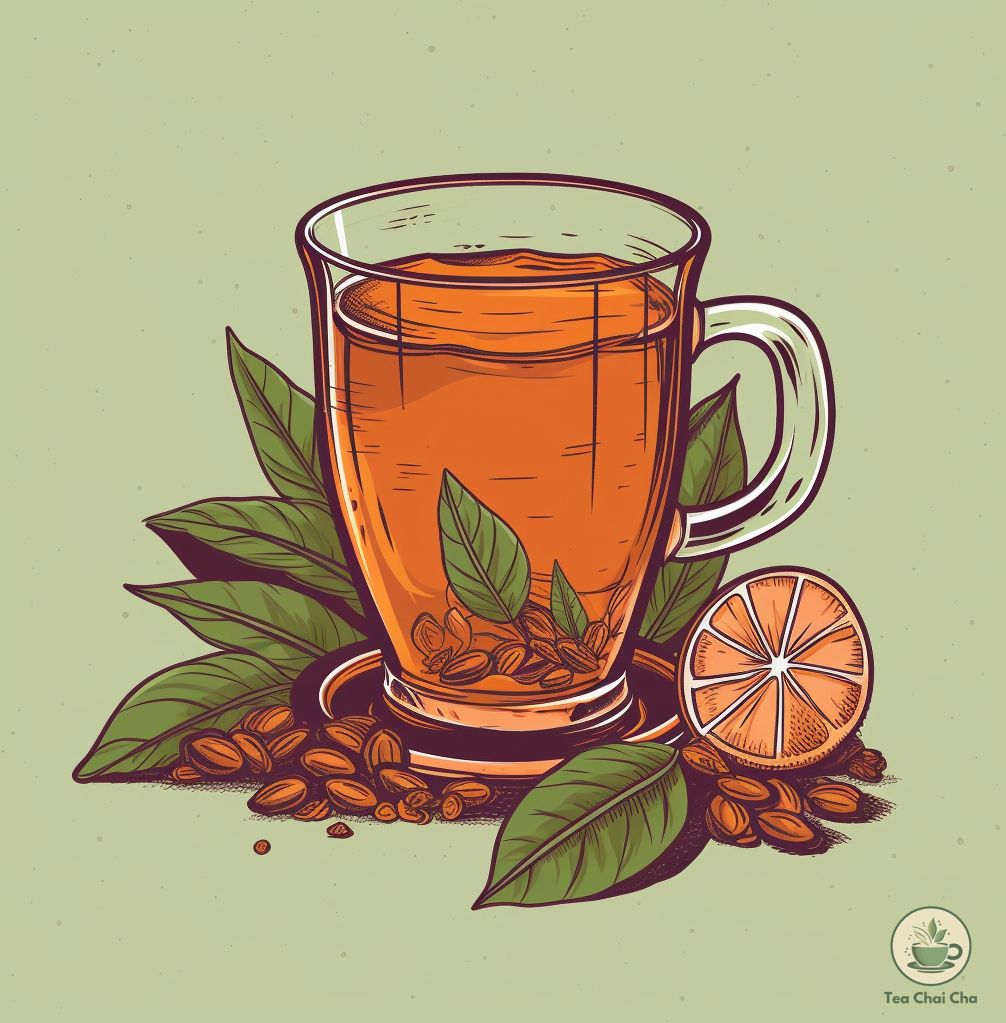
Black Tea Has 40-70 mg Caffeine per 8-ounce Cup
If you’re looking for a bit of a caffeine kick, black tea has got your back.
It’s more on the bold side, with around 40-70 milligrams of caffeine per 8-ounce cup.
That’s comparable to a cup of coffee for some folks!
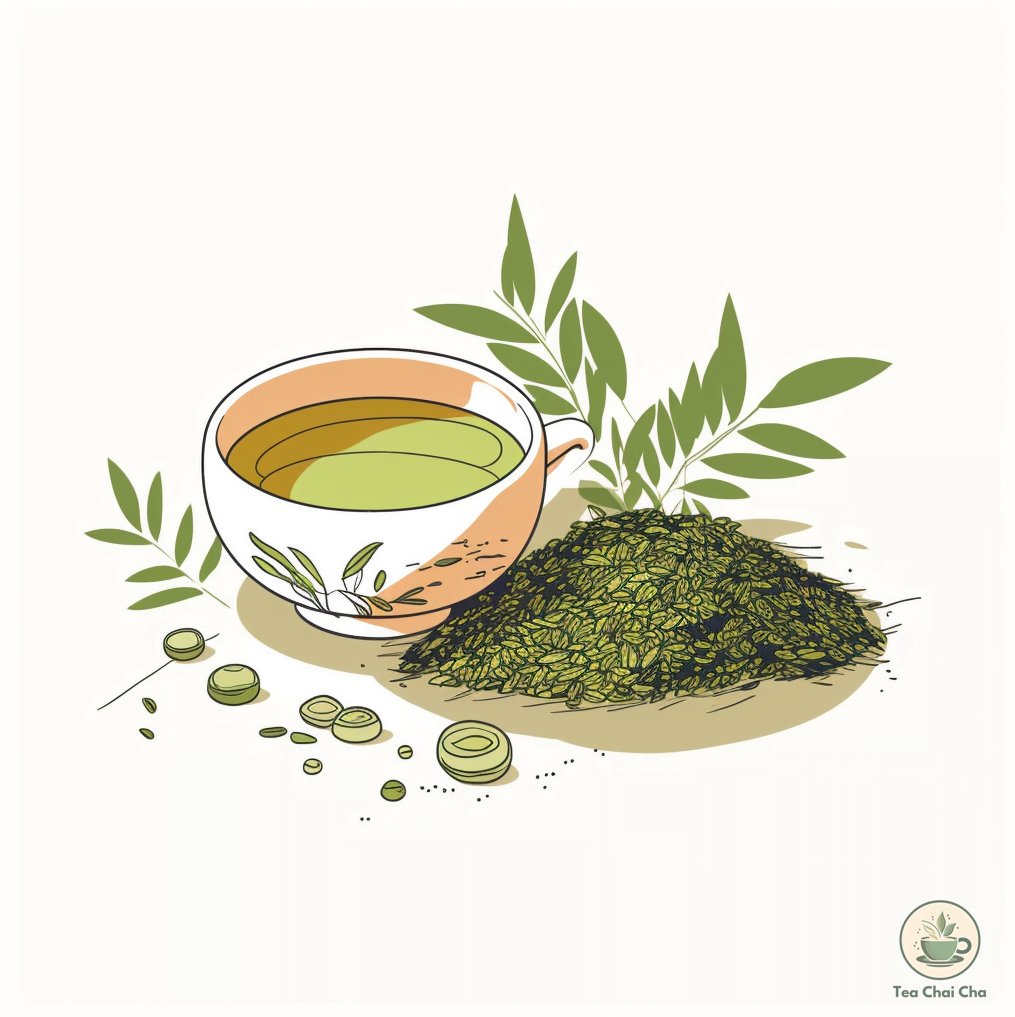
Green Tea Has 20-45 mg Caffeine per 8-ounce Cup
Ah, the green goddess of calm and antioxidants.
Green tea is gentler in the caffeine department, typically hanging around 20-45 milligrams in that same 8-ounce cup.
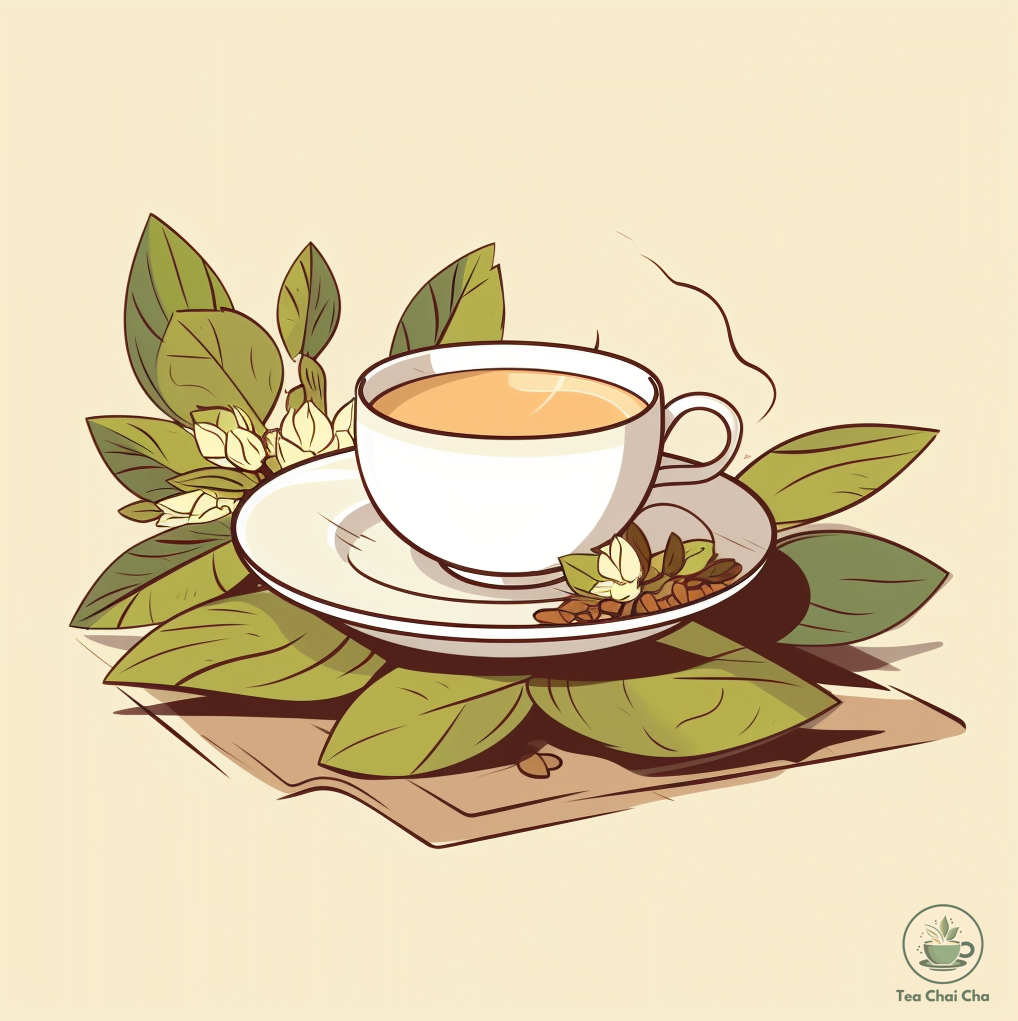
White Tea Has 15-30 mg Caffeine per 8-ounce Cup
Picture a soothing, delicate brew – that’s white tea.
It’s even milder on the caffeine scale, usually packing around 15-30 milligrams.
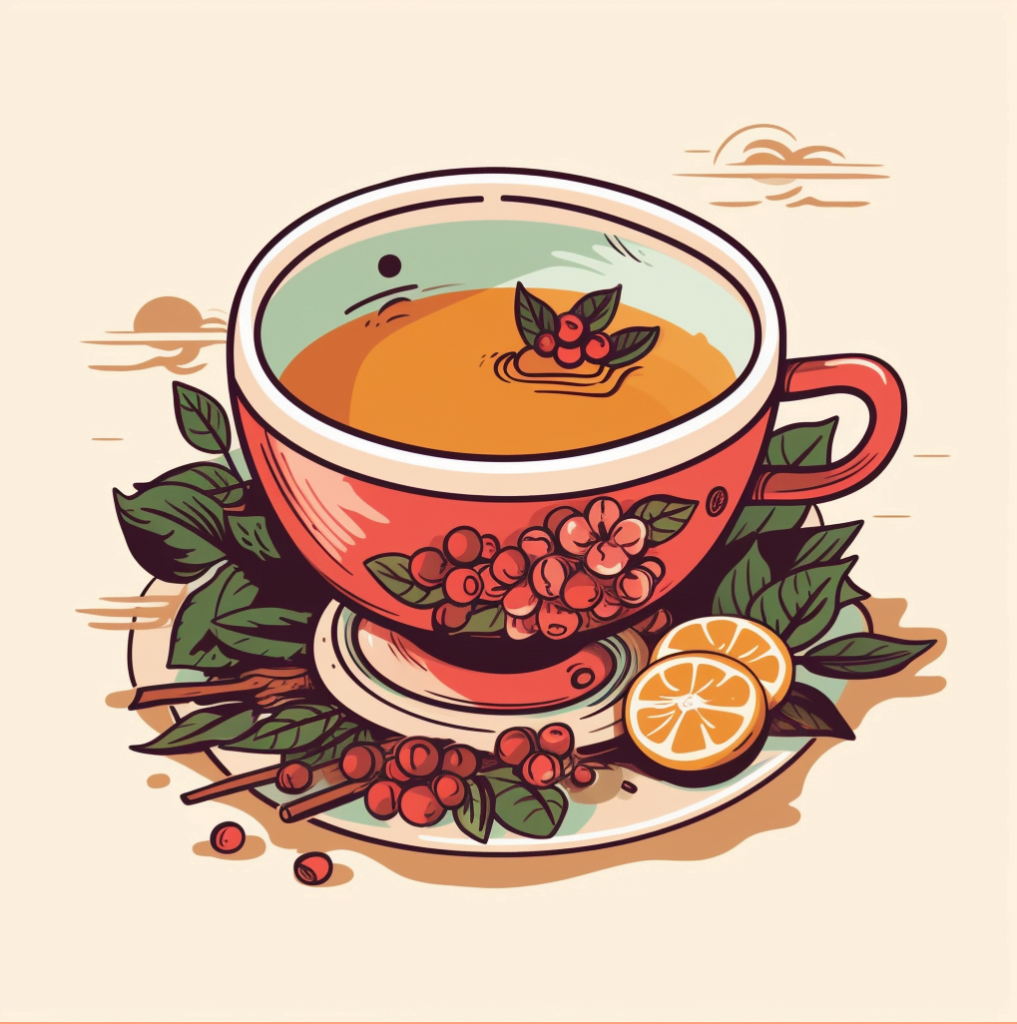
Oolong Tea Has 30-50 mg Caffeine per 8-ounce Cup
Oolong sits somewhere between green and black, with roughly 30-50 milligrams per 8 ounces.
It’s like the Goldilocks of teas – not too strong, not too light.
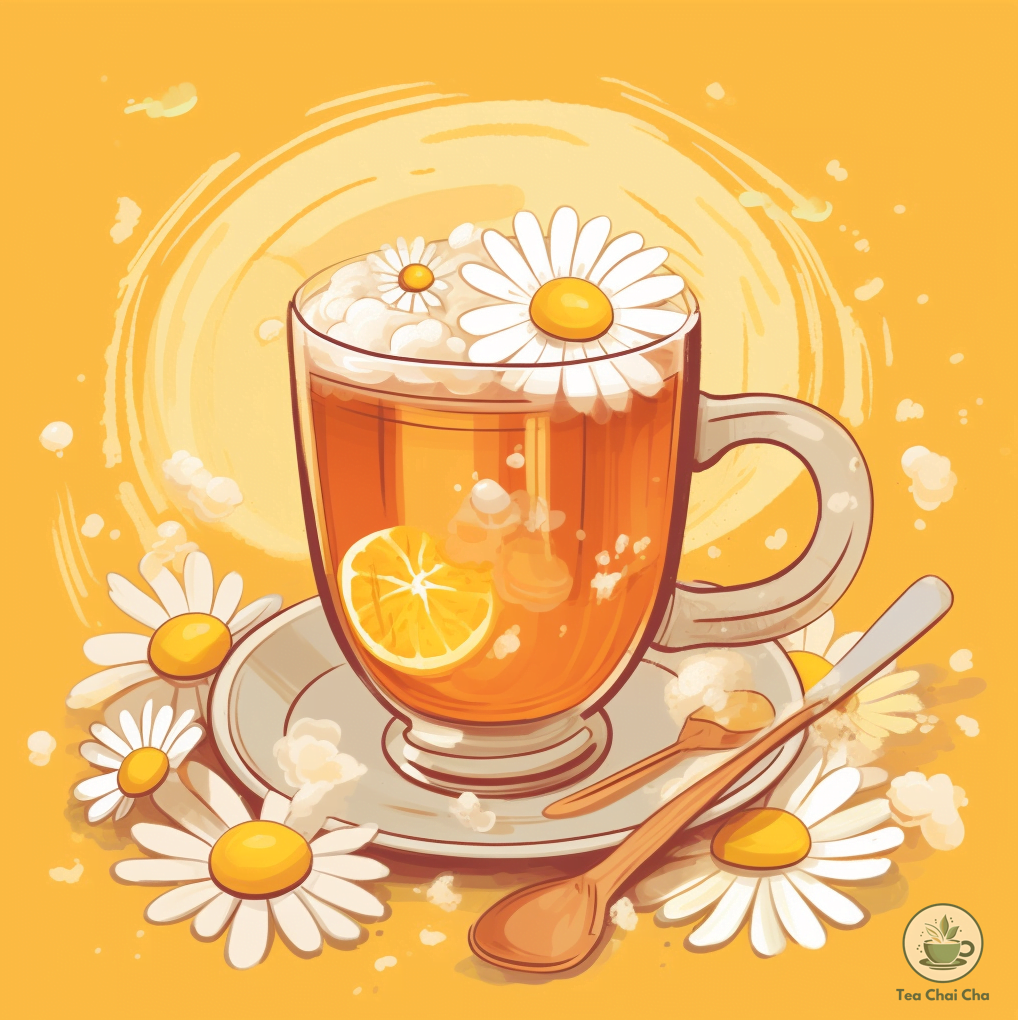
Herbal Tea Has 0 mg Caffeine per 8-ounce Cup
Herbal teas are a caffeine-free haven.
So, if you’re looking for a caffeine break, brew up some chamomile, peppermint, or rooibos – you’re good to go.
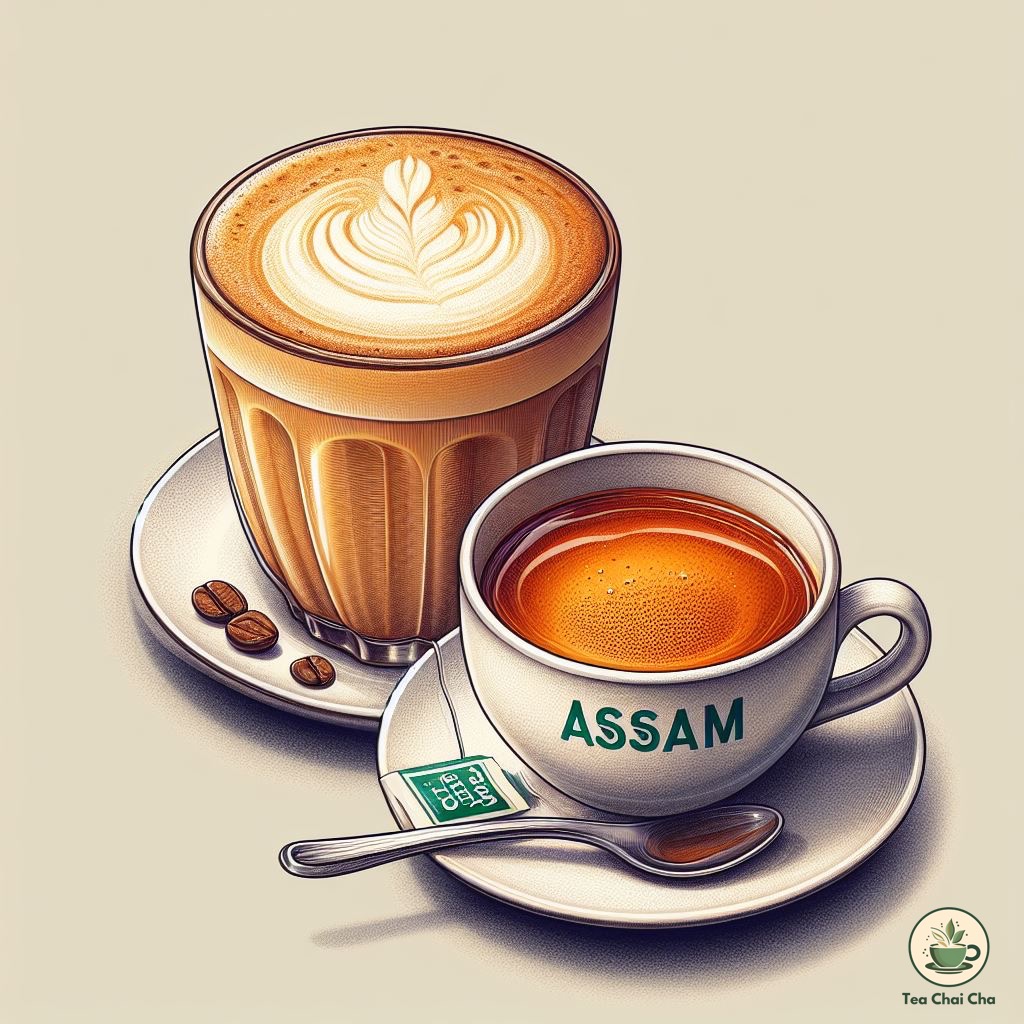
How Much Caffeine Is in Tea vs Coffee
When it comes to caffeine, tea and coffee are like the heavyweight champions of the beverage world. Each has its loyal fan base, but their caffeine content isn’t something to take lightly.
So, let’s take a closer look at these contenders.
-> Caffeine in Tea
Alright, tea lovers, you’ll be pleased to know that tea is generally a bit gentler on the caffeine front.
Tea’s caffeine content varies depending on the type.
For instance, herbal teas, like chamomile or peppermint, are usually caffeine-free.
Green tea, which is known for its health benefits, contains moderate caffeine, enough to give you a subtle energy boost without the jitters.
But if you’re after something with a bit more oomph, black tea might be your cup of choice.
-> Caffeine in Coffee
Now, for all you coffee connoisseurs out there, brace yourselves!
Coffee, especially that morning brew, packs a caffeine punch that can jolt you awake faster than a bolt of lightning.
A typical cup of coffee contains significantly more caffeine compared to tea.
Espresso, the concentrated coffee shot, is like the turbocharger of the coffee world.
Drip Coffee
Your classic drip coffee boasts an impressive 95 milligrams per 8-ounce cup on average.
Espresso
For those who like their caffeine concentrated, espresso is the way to go.
A single shot can contain about 63 milligrams, packing a quick and intense caffeine punch.
But here’s the catch – the caffeine spike you get from coffee is often followed by a crash, leaving you in a cycle of energy ups and downs.
Tea vs. Coffee Caffeine
Let’s sum it up in a quick caffeine cheat sheet:
- Standard 8-ounce cup of coffee: Approximately 95 milligrams of caffeine.
- 8-ounce cup of black tea: Around 50 milligrams of caffeine.
- 8-ounce cup of green tea: Roughly 30 milligrams of caffeine.
Is the Caffeine in Tea Better than the Caffeine in Coffee?
At first glance, caffeine in tea and coffee seems like a perfect match, chemically identical.
But hold on to your teacups because here’s the twist – your body interprets them in completely different ways.
The secret ingredient?
It’s all about the friends they bring along – the compounds and polyphenols.
Tea’s Magic Bond with Caffeine
In tea, caffeine waltzes with catechins (those are like the tannins‘ cooler cousins).
These catechins form a bond with caffeine, and together, they create what we call a “slow-release” effect.
This means the caffeine doesn’t rush into your system like a coffee sprinter; it’s more of a leisurely stroll.
Fans of matcha might know this feeling – a longer, steadier caffeine buzz.
Tea Caffeine vs. Coffee Caffeine
Now, let’s talk about how caffeine in tea and coffee shake hands with your central nervous system and cardiovascular system.
Coffee’s caffeine goes straight for the heart, increasing your heart rate and blood circulation – it’s like an energizing jolt.
But tea? Well, it’s a bit of a brainiac.
The caffeine in tea does something rather nifty – it widens the blood vessels in your cerebral cortex.
In simple terms, it’s more of a mind-sharpener than a heart-racer.
So, if you’re looking to stay alert without the caffeine rollercoaster, tea might be your new best friend.
L-Theanine & the Caffeine in Tea
You know about caffeine in your cuppa now, but there’s more to it than meets the eye.
Tea has a trio of stimulating pals: caffeine, theophylline, and theobromine.
They’re like the entourage of your tea experience, each with their own unique roles.
While caffeine gets all the attention, theophylline and theobromine tag along, subtly boosting your heart rate and increasing blood flow.
The L-theanine Twist
Now, here’s where it gets really interesting: L-theanine, a mighty amino acid found in tea.
This amino acid, just like caffeine, has a backstage pass to your central nervous system.
But instead of the jitters, L-theanine brings a sense of calm alertness.
Studies have shown that L-theanine is like a conductor for alpha waves in your brain.
These waves are linked to that sweet spot of alert relaxation – you know, that feeling you get when sipping a warm cup of your favorite tea.
But the L-theanine magic doesn’t stop there.
It also has a friendly chat with neurotransmitters like dopamine and GABA by putting the brakes on glutamate.
In simple terms, this helps create a relaxing effect on your mind and body.
GABA Cha Oolong – An Example
You might be wondering, “How does this all come together?”
Well, imagine a tea like GABA Cha Oolong.
It’s not just your average cuppa; it’s a powerhouse for relaxation and focus.
The dynamic duo of caffeine and L-theanine in this brew is what makes it special.
They team up to boost your cognitive performance and keep you alert without sending your central nervous system into overdrive.
It’s similar to have your own mindfulness coach in a teacup!
8 Benefits of Caffeine in Tea
Now that you’ve dipped your toes into the world of caffeine in tea, let’s explore the benefits that come with this humble stimulant.
Don’t be fooled by its simplicity; caffeine brings a lot to the table when it meets your favorite brew.
So, brew a fresh cup and let’s get into it!
1. Wake-Up Call with a Difference
Caffeine is renowned for its ability to give us that morning jolt, but when it’s paired with tea, it’s like a gentle nudge rather than a caffeine-fueled rollercoaster.
The result?
A smoother, more sustained burst of energy that can kickstart your day without the jitters.
2. Mental Agility and Focus
Ever had one of those days when your brain feels a bit sluggish?
Well, caffeine in tea might just be your mental booster.
It’s like a mini brain wake-up call, enhancing alertness and focus without overloading your nervous system.
Perfect for tackling those tough tasks.
3. A Heart-Healthy Brew
Believe it or not, caffeine in moderation can be heart-healthy.
Tea’s antioxidants combined with caffeine can promote good heart health by improving blood flow and reducing the risk of certain cardiovascular issues.
So, while you’re sipping your tea, you’re also showing some love to your ticker.
4. Metabolism Boost
If you’re looking to shed a few extra pounds, caffeine in tea could be your secret weapon.
It has been shown to rev up your metabolism, helping your body burn calories more efficiently.
Of course, it’s not a magic solution, but every little boost helps, right?
5. Antioxidant Powerhouse
Tea is already known for its antioxidants, and caffeine adds an extra layer of defense against those pesky free radicals.
This dynamic duo can help protect your cells from damage, potentially reducing the risk of chronic diseases and keeping you feeling your best.
6. Mood Enhancement
Ever notice how a cup of tea can be calming?
Well, caffeine plays a part in that, too.
It can stimulate the release of certain neurotransmitters in your brain, making you feel happier and more relaxed.
7. Reduced Risk of Neurodegenerative Diseases
Emerging research suggests that caffeine intake may be associated with a decreased risk of neurodegenerative conditions like Alzheimer’s and Parkinson’s disease.
It’s an exciting area of study that holds promise for the future.
8. Improved Physical Performance
If you’re into sports or simply enjoy a good workout, caffeine can be your secret weapon.
It’s known to enhance physical performance by increasing adrenaline levels in your body.
That means more energy for that extra lap around the track or one more rep at the gym.
6 Side Effects of Caffeine in Tea
Now, It’s time to explore the flip side – the potential side effects.
While caffeine can offer that much-needed pick-me-up, it’s essential to understand its impact on your body.
So, let’s put on our scientific hats and unravel the intricacies of caffeine’s potential consequences.
1. The Jitters and Restlessness
Caffeine, a natural stimulant, can certainly give you that much-needed wake-up call.
However, it can also lead to the notorious “jitters.”
You know that feeling when your hands seem a tad shaky?
Yep, that’s the caffeine talking.
Some people are more sensitive than others, so pay attention to your body’s signals.
2. Trouble Sleeping
Ah, the flip side of caffeine-induced alertness.
If you’ve ever had a cup of tea too close to bedtime and found yourself staring at the ceiling instead of catching some Z’s, you’re not alone.
Caffeine’s wakefulness-promoting effects can disrupt your sleep patterns, so it’s wise to consider a caffeine curfew.
3. Digestive Drama
Tea, especially when consumed in large quantities, can sometimes stir up digestive trouble.
Caffeine can be a bit of a daredevil in this department, potentially causing stomach upset or even heartburn in sensitive individuals.
Moderation is key here.
4. Increased Heart Rate
That zippy feeling you get after a caffeine boost?
Well, it can extend to your heart rate too.
Caffeine can temporarily speed up your ticker, which may not be ideal for those with certain heart conditions or high blood pressure.
Be sure to consult with your healthcare provider if you have concerns in this area.
5. Dependency and Withdrawal
Caffeine is sneaky.
Enjoy it daily, and your body might start expecting its daily dose.
This can lead to dependency, which means missing your cup of tea might result in headaches and irritability. Withdrawal is no fun!
6. Anxiety and Nervousness
For some, caffeine can ramp up feelings of anxiety and nervousness.
If you’re prone to these emotions, it might be a good idea to keep your caffeine intake in check and opt for lower-caffeine teas.
Who Should Avoid Caffeine in Tea
There are individuals who should approach caffeine with caution or avoid it altogether due to various reasons.
1. Pregnant Individuals
The miracle of life is a wondrous thing, and during pregnancy, extra care is paramount.
Caffeine can cross the placenta and affect the developing fetus.
High caffeine intake during pregnancy has been associated with a higher risk of preterm birth and low birth weight.
To err on the side of caution, many health experts recommend limiting caffeine intake during this special time.
2. Sensitive Sleepers
We all have that friend who can have an espresso after dinner and sleep like a baby.
But for others, caffeine is a sleep disruptor.
If you’re someone who’s particularly sensitive to caffeine, even that afternoon cup of tea might lead to restless nights.
Keep an eye on how caffeine impacts your sleep quality and adjust your intake accordingly.
3. Certain Medical Conditions
Caffeine can have varying effects on individuals with specific medical conditions.
Those with gastroesophageal reflux disease (GERD) might find that caffeine exacerbates their symptoms.
It can also be a trigger for anxiety disorders and worsen symptoms for those dealing with irritable bowel syndrome (IBS).
If you have any underlying health issues, it’s wise to consult with a healthcare professional regarding your caffeine consumption.
4. Children and Adolescents
Younger folks, especially children and adolescents, are still growing and developing.
Their sensitivity to caffeine can differ from that of adults.
Excessive caffeine intake at a young age can lead to sleep disturbances, increased heart rate, and other undesirable effects.
It’s essential for parents and guardians to monitor and limit caffeine intake for their young ones.
5. Certain Medications
Caffeine can interact with various medications, altering their effectiveness or causing unwanted side effects.
For instance, some medications for heart conditions, migraines, and even asthma may not play nice with caffeine.
Always check with your healthcare provider or pharmacist if you’re uncertain about how caffeine might interact with your medications.
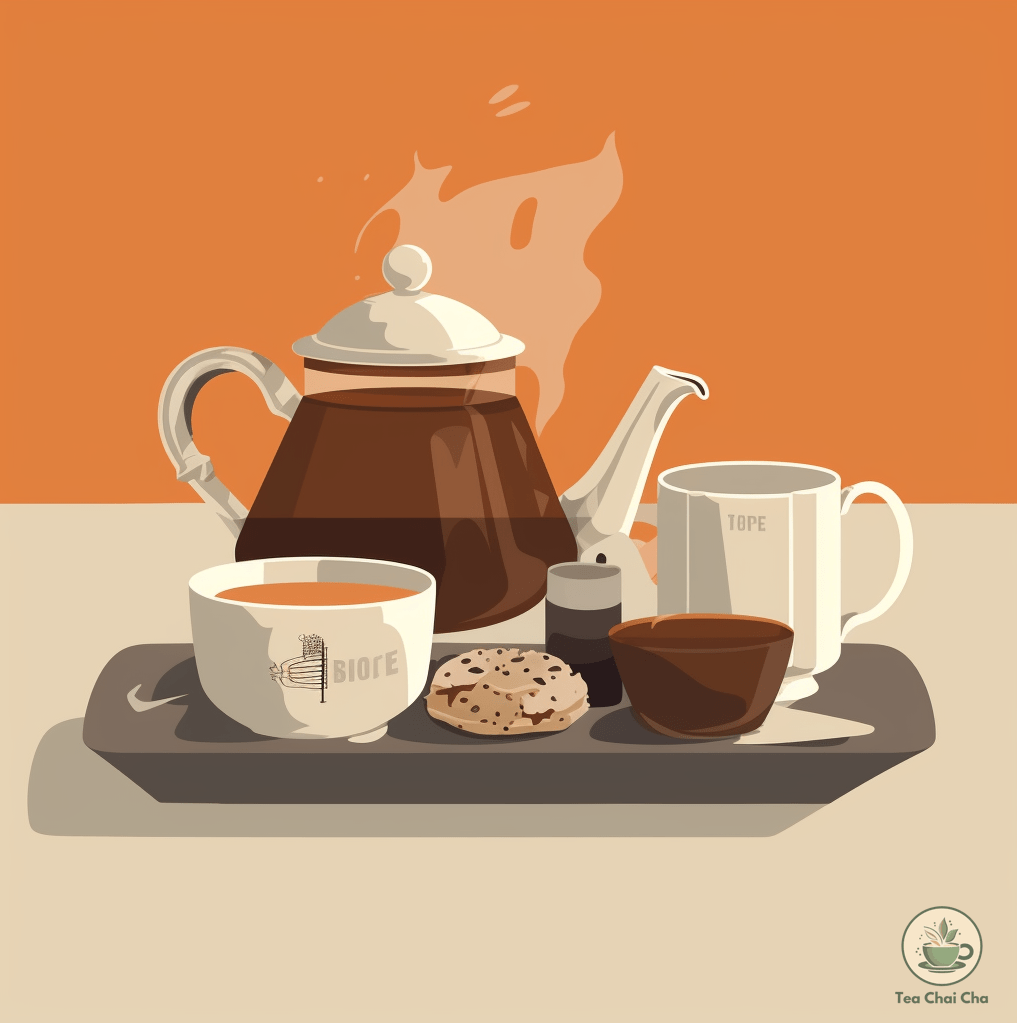
8 Factors Influence the Caffeine Content of Tea
Let’s check what makes your cup of tea tick – the factors that influence how much caffeine you’ll find in that steaming brew.
Ever wondered why one cup of tea can be as mellow as a Sunday morning and another as perky as a sunrise?
Well, it’s time to spill the tea on what’s really going on.
1. Tea Leaf Type
First up, we have the tea leaf itself. The type of tea you choose sets the caffeine stage.
Black, green, white, oolong, and herbal – they all bring their unique caffeine game to the table.
Some are caffeine powerhouses, while others are more laid-back.
It’s like each tea has its own caffeine personality!
2. Tea Leaf Processing
Once those tea leaves are plucked, how they’re processed matters too.
Oxidation, drying, and rolling – these steps can either amp up or mellow out the caffeine content.
So, whether your tea is fresh and green or aged to perfection, processing plays a vital role.
3. Brewing Time and Temperature
Now, here’s where your own actions come into play.
The longer you steep your tea and the hotter the water, the more caffeine you’ll extract.
It’s like dialing up or down the caffeine knob according to your preference.
So, are you a quick-dipper or a slow-steeping aficionado?
4. Tea Cut and Size
Tea leaves come in all shapes and sizes – from whole leaves to finely ground powder.
The cut and size of your tea affect how much caffeine gets released during brewing.
So, whether it’s loose leaves or a bagged delight, your choice makes a difference.
5. Water Quality
Water quality might not be something you think about when you brew your tea, but it matters.
The minerals and pH of your water can impact how well caffeine is extracted from the leaves.
Clean, filtered water is the unsung hero of a perfect brew.
6. Growing Conditions and Geography
Where the tea is grown and the conditions it’s raised in can be a game-changer.
Different regions and altitudes produce teas with varying caffeine levels.
It’s all about the terroir of tea – the essence of its birthplace.
7. Seasonal Variations
Tea is a bit like a chameleon, changing its caffeine content with the seasons.
Factors like weather and harvest time can influence how much caffeine ends up in your cup.
So, don’t be surprised if your favorite brew tastes a little different from one season to the next.
8. Tea-to-Water Ratio
This one’s all about balance.
The amount of tea leaves you use compared to the water in your brew can make or break your caffeine game.
It’s a simple equation: more tea equals more caffeine in your cup.
So, how do you find that perfect balance? It’s a bit like a culinary dance.
If you want a strong, robust cup, you’ll need a higher tea-to-water ratio.
But if you’re aiming for a milder, gentler flavor, go easy on the leaves.
Know that – there’s no one-size-fits-all ratio, as it depends on your personal taste and the type of tea.
But as a general guideline, a teaspoon of loose leaf tea per 8 ounces of water is a great starting point.
For teabags, one bag per cup usually does the trick.
Caffeine-Free vs. Decaffeinated Tea
Do you know about caffeine-free and decaffeinated teas?
Have you ever wondered if they’re the same thing?
Or maybe you’re curious about which one is best for you?
Let’s find out!
| Aspect | Caffeine-Free Tea | Decaffeinated Tea |
|---|---|---|
| Caffeine Content | Naturally caffeine-free from the start | Caffeine is removed or significantly reduced during processing |
| Flavor and Taste | Pure, natural flavors of the tea leaves | May have a slightly altered taste due to the decaffeination process |
| Caffeine Sensitivity | Suitable for those sensitive to caffeine | Ideal for those who want to reduce caffeine intake |
| Varieties | Available in a wide range of herbal and botanical blends | Typically available in traditional tea varieties like black, green, and white |
| Health Benefits | May offer unique health benefits from the herbs and botanicals used | Retains some health benefits of tea, such as antioxidants, with reduced caffeine |
| Preparation | Brewed like regular tea, no special preparation needed | Brewed similarly to regular tea, but with slightly altered steeping times |
| Caffeine Levels | Virtually zero caffeine | Contains trace amounts of caffeine, usually much less than regular tea |
| Caffeine-Free Hug | Perfect for bedtime or caffeine-sensitive individuals | Great for those who love the taste of tea but want less caffeine |
Caffeine-Free Tea
First up, we have caffeine-free tea. Now, this is the real deal when it comes to zero caffeine.
These teas are naturally caffeine-free from the get-go.
That’s right – no caffeine lurking in the leaves to begin with.
Most of them are herbal teas or tisanes that are made from different parts of different plants (other than Camellia sinensis.)
Decaffeinated Tea
On the flip side, we’ve got decaffeinated tea.
These teas start their journey with caffeine, just like regular teas.
But here’s the twist: somewhere along the way, the caffeine is removed or significantly reduced.
In short, these teas often come from Camellia sinensis but are ripped off of caffeine during production.
The Key Difference
So, what’s the key difference between these two?
Well, it all boils down to how they’re made.
Caffeine-free teas are naturally caffeine-free, while decaffeinated teas undergo a process to remove or reduce caffeine levels.
It’s like the difference between a naturally curly hairstyle and one that’s been temporarily straightened.
Both are fabulous, but they take different paths to get there.
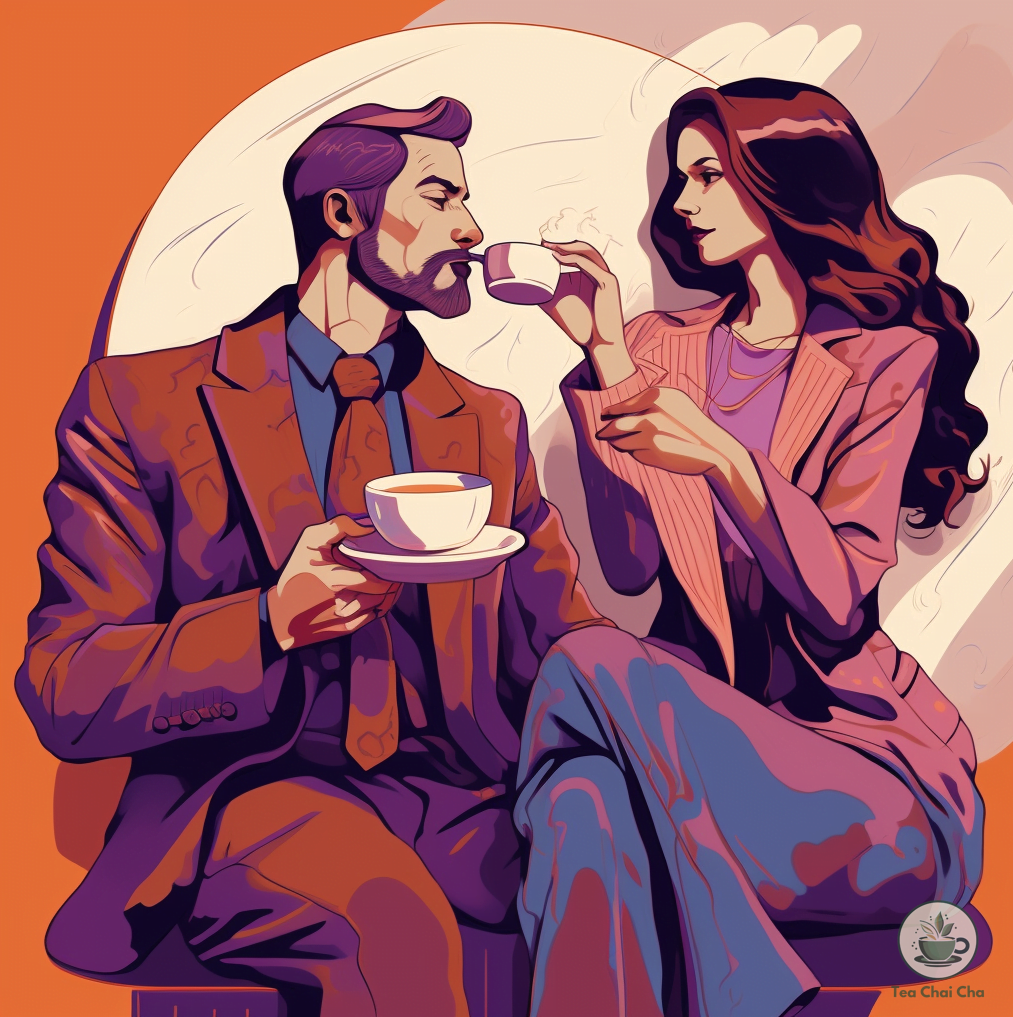
8 Ways to Reduce Caffeine in Tea
So, you’ve just learned a thing or two about the caffeine levels in your favorite cup of tea, and maybe you’re thinking,
“I love my tea, but sometimes I’d like to dial down the caffeine a bit.”
Well, you’re in luck because I’ve got some tips and tricks up my sleeve to help you reduce the caffeine in your brew without sacrificing the flavor.
1. Choose Decaf Tea Blends
First up, the decaf delight!
Decaffeinated teas are your caffeine-cutting champions.
They give you all the flavor without the caffeine punch.
So, if you’re looking for a mellow cuppa, consider reaching for a decaffeinated version of your favorite tea.
2. Opt for Herbal Infusions
Herbal teas are caffeine-free wonders.
They come in a kaleidoscope of flavors, from soothing chamomile to zesty peppermint.
These herbal infusions provide a caffeine-free oasis for your taste buds and tranquility for your mind.
3. Shorten Your Steeping Time
Here’s a neat trick: the longer you steep your tea, the more caffeine it releases.
So, if you’re using regular tea leaves, try steeping for a shorter time.
It’s a simple adjustment that can make a big difference in caffeine content.
4. Blend Your Tea
Get creative in your tea experiments!
Mixing your favorite tea with a caffeine-free herbal blend can dial down the caffeine content.
It’s about creating your custom caffeine level – how cool is that?
5. Go for Cold Brew
Cold brewing is not only trendy but also a caffeine-reducing technique.
When tea is cold-brewed, it extracts fewer caffeine molecules than hot water.
So, steeping tea leaves in cold water for an extended period results in a smoother, lower-caffeine brew.
Plus, it’s refreshingly chilled!
6. Rinse and Repeat
If you’re using loose leaf tea, give it a quick rinse before brewing.
This rinse can wash away some of the initial caffeine content, making your cuppa a tad gentler.
7. White Tea
For those looking for a middle ground, white tea might be your answer.
It contains less caffeine than black or green tea but more than herbal infusions.
8. Caffeine-Free Alternatives
Lastly, explore the world of caffeine-free alternatives.
From fruity tisanes to earthy rooibos, there’s a universe of flavors to enjoy without worrying about caffeine.
Feeling a bit sluggish and in need of a pick-me-up?
Then, you won’t want to miss the teas that contain highest caffeine contents.
They’re perfect to give you the energy boost you crave!
Related Caffeine Guides
- How Much Caffeine in Green Tea – Numbers to Know!
- How Much Caffeine in Black Tea – High/Low Caffeine Black Teas
- Does Oolong Tea Have Caffeine?
- Does White Tea Have Caffeine? High and Low Caffeine Options!
- Does Milk Tea Have Caffeine? Is Boba Tea Caffeinated?
- Does Herbal Tea Have Caffeine? Which One Has More Caffeine?
Frequently Asked Questions (FAQs)
Does tea have as much caffeine as coffee?
Nope, tea generally has less caffeine than coffee.
On average, an 8-ounce cup of tea contains about 30-70 milligrams of caffeine, while coffee usually packs in around 95 milligrams per 8-ounce cup. So, tea is your milder caffeine buddy.
How much caffeine is in decaffeinated tea?
Decaffeinated tea isn’t caffeine-free, but it’s much lower in caffeine compared to regular tea.
You’re looking at roughly 2-5 milligrams of caffeine in an 8-ounce cup of decaf tea.
Is caffeine in tea bad for you?
For most people, moderate caffeine intake from tea is perfectly fine.
In fact, some studies suggest it may have health benefits like antioxidants.
However, excessive caffeine can lead to issues like insomnia or jitters, so it’s all about balance.
How much caffeine should I consume each day?
It’s generally recommended that adults keep their caffeine intake under 400 milligrams per day, which is roughly four 8-ounce cups of brewed coffee or 8-12 cups of tea.
Keep in mind that individual tolerance varies.
How much caffeine in a tea bag?
The caffeine content in a tea bag can vary widely based on the type of tea, amount of tea, tea processing, etc.
On average, a standard tea bag contains about 30-70 milligrams of caffeine.
How much caffeine is in a cup of tea?
A typical 8-ounce cup of tea contains around 30-70 milligrams of caffeine. Herbal teas are often caffeine-free or very low in caffeine.
Black and green teas tend to have a bit more falling in that range while matcha exceeds 170 mg caffeine per cup.
